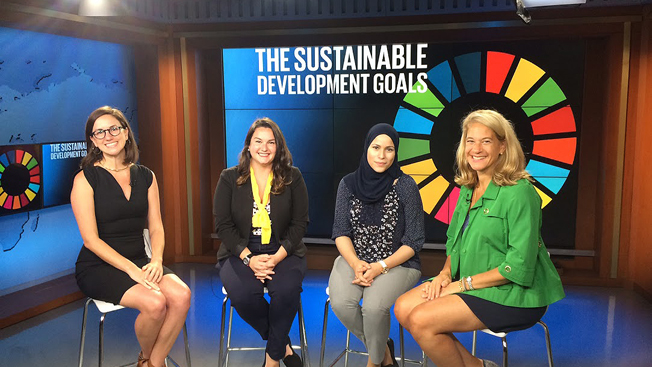“Addressing inequalities and Challenges to inclusion through fiscal, wage and social protection and HLS under the theme: “Empowering People and Ensuring Inclusiveness and Equality” New York 15 February 2019
On the occasion of the UN Commission for Social Development that took place from 11 to 21 February 2019, the World Family Organization (WFO) hosted a luncheon on 15 February at the Delegate’s Dining Room premises at the UNHQ in New York.
The overarching theme of this luncheon and discussion was focused around the topic of “addressing inequalities and challenges to inclusion through fiscal, wage and social protection policies” with the aim to further contribute to the ECOSOC 2019 High-Level Political Forum and High-Level Segment under the theme of “Empowering people and ensuring inclusiveness and equality”.
The luncheon was moderated by Ms. Hanifa Mezoui, PhD and attended by the President of the WFO, Dr. Deisi Kusztra together with Mr. Isidro de Brito, Vice-President for Legal and Administrative Affairs of WFO (Portugal) who presented WFO’s work over the past year and how effective UN family policies could contribute to reaching the common goal of equality and inclusiveness in all spheres of life.
In a spirit of partnership, the luncheon was attended by other notable officials from the UN Department of Social and Economic Affairs, including, Ms. Daniela Bas (Directorof DESA’s Division for Inclusive Social Development), Mr. Alberto Padova (Chiefof DESA’s Social Inclusion and Participation Branch), Mr. Navid Hanif, Directorof DESA’s Financing for Sustainable Development Office, the UN Global Compact, Mr. Angus Rennie) Marc-Andre Dorel, Acting Chief, NGO Branch and the Secretariat of the G77.
Additional participants from civil society included, Ms. Suneeta Dewan, representing Children’s Hope India, who contributed on the role of social inclusiveness and equality in developing countries with the focus on children and youth growing up in poverty and lack of opportunities as well as the need for empowering women. The International Federation for Family Development (IFFD) represented by its President, Mr. Ignacio Socias gave a briefing of the CSD57 side event coordinated in partnership with various stakeholders, titled: “The value of Unpaid Care and Domestic Work* – Is Target 5.4 a Utopia?” He presented the IFFD Family Award for 2019, to, among others, Ania Feron and the country of Austria.
The luncheon was also honored by the presence of H.E., Mr. Mohamed Fathi Ahmed Idrees, Former Chair Group77 for 2018, Ambassador Permanent Representative of Egypt to the United Nations, who emphasized, the crucial role played by Member States in financing the 2030 Agenda for Sustainable Development by highlighting international cooperation, North-South, South-South and Triangular Cooperation.
The discussion revolved on the need to combat discrimination and social exclusion by promoting inclusion through social protection systems that will enable families to thrive.
Concerns were also raised on: How to align the global financial system with sustainable development? And how to advance the finance mechanisms for the SDGs and develop initiatives to reduce the current investment gap?
It was also reported that at its January 2019, regular session, the NGO Committee on Non-Governmental Organizations had before it 521 applications and recommended 236 of them for consultative status. It was mentioned that in regards to the geographic distribution, efforts have to be made to increase the number of NGOs from Africa and Latin America.
We were also briefed, on activities and contribution to this year’s 63rdCommission on the Status of Women and to the upcoming Fourth Forum on Financing for Development.
We would like to express our sincere appreciation to everyone who attended this very fruitful and inspiring discussion and we recognize the dedicated efforts of WFO in working with local authorities to advance the 2030 Agenda and SDGs in relations to family issues.
*“Recognize and value unpaid care and domestic work through the provision of public services, infrastructure and social protection policies, and the promotion of shared responsibility within the household and the family as nationally appropriate” Tuesday, February 12th, 2018




 A CATALYTIC GATHERING AT UNITED NATIONS HEADQUARTERS
A CATALYTIC GATHERING AT UNITED NATIONS HEADQUARTERS


 The Committee of Experts on Public Administration will hold its sixteenth session at the United Nations in New York from 24 to 28 April 2017. The main subject of discussion will be “Ensuring effective implementation of the Sustainable Development Goals: leadership, action and means”.
The Committee of Experts on Public Administration will hold its sixteenth session at the United Nations in New York from 24 to 28 April 2017. The main subject of discussion will be “Ensuring effective implementation of the Sustainable Development Goals: leadership, action and means”.